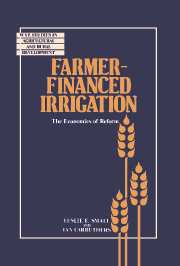Part II - Criteria for evaluating irrigation financing policies
Published online by Cambridge University Press: 05 November 2011
Summary
Irrigation financing policies can be deemed successful to the extent that they achieve desirable objectives. In Chapter 3 of Part I, we identified five criteria reflecting alternative objectives for financing policies, and against which they could be evaluated. In Part II we examine in some detail the policy issues associated with each of these objectives.
The first three chapters of Part II deal with objectives related to the efficiency with which the various resources devoted to irrigation are used. We begin in Chapter 4 by examining to what extent, and under what conditions, financing policies can be expected to promote effective use of the resources devoted to operation and maintenance. It is our contention that although the link may not be direct, inappropriate financial policies are an often-overlooked contributing factor to the common problems of poor irrigation operation and maintenance. In Chapter 5 we turn our attention to the relationships between financial policies and the efficiency with which water itself is used by the farmers. Finally, in Chapter 6 we consider how financial policies affect the decisions that commit resources to irrigation through the investment process.
In Chapter 7 we turn to an examination of a different type of efficiency objective, namely, the efficiency of the process by which the resources needed for irrigation are acquired.
Efficiency is but one of two broad objectives commonly identified by economics. The other is equity, which is the topic of Chapter 8.
- Type
- Chapter
- Information
- Farmer-Financed IrrigationThe Economics of Reform, pp. 58 - 59Publisher: Cambridge University PressPrint publication year: 1991



